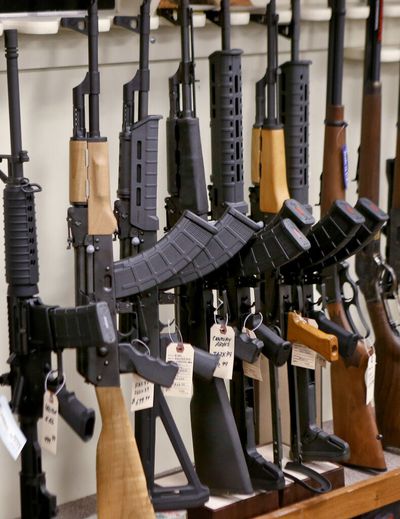Washington’s voter-approved semiautomatic rifle restrictions constitutional, judge rules

A law restricting the sale of semi-automatic rifles approved by voters in 2018 is constitutional, a federal judge ruled Monday.
U.S. District Judge Ronald Leighton rejected the challenge to Initiative 1639 filed by gun rights groups and some gun dealers. The initiative’s provisions that restrict the sale of those rifles to those at least 21 and prohibit sales to out-of-state buyers don’t place unreasonable restrictions on the Second Amendment, he ruled.
Restrictions on the age to buy, possess and use firearms have existed for more than a century, Leighton said, and Washington already restricted the sale of handguns to those younger than 21 before the initiative passed.
“While states may vary in terms of the specific guns or activities they regulate, restrictions on potentially dangerous firearm conduct by those under the age of 21 is a common refrain,” he wrote in his 19-page opinion. “There is no reason why a restriction on sale and possession of semi-automatic rifles – powerful weapons that can be wielded against the public – constitutes a break from this pattern.”
States set a minimum age for drinking alcohol and consuming tobacco for public health and safety concerns, he noted.
“In sum, 18- to 20-year-olds are developmentally immature, commit a disproportionate share of violent crimes and have been successful subjects of public health and safety regulation in the past,” Leighton wrote.
Washington Attorney General Bob Ferguson, whose office by law defends initiatives if they pass, called it a common-sense gun reform. Groups like the National Rifle Association and the Second Amendment Foundation are trying to “undermine the will of the voters,” he said.
Kate Stockert, with the state chapter of Moms Demand Action, called it “another victory for gun safety in Washington.”
Alan Gottlieb of the Second Amendment Foundation said gun-rights groups expected Leighton to rule in favor of the initiative, based on comments the judge made during oral arguments regarding the actions of people under 21.
The appeals court ruling Leighton cites in his ruling restricted handguns for those under 21 because they could still have rifles to protect themselves. Restricting semi-automatic rifles narrows that further, Gottlieb said.
“We definitely plan to appeal to the 9th Circuit,” he said, referring to the appeals court for most Western states.
The initiative, which received the support of 59.35% of voters in 2018, extended the state’s age restrictions and stricter background check requirements then on handguns to semi-automatic rifles. Those extended background checks go beyond the federal instant criminal background system to include state crime records and concealed pistol licenses, court and state corrections databases and the state Health Care Authority’s mental health records.
“This helps prevent ineligible purchasers from falling through the cracks,” Leighton said.
The initiative also prohibits Washington dealers from selling a semi-automatic rifle to a resident of another state.
The plaintiffs did not produce any evidence that provision in the initiative violates the Commerce Clause of the Constitution, Leighton wrote. Even if they had produced records of diminished sales, that would have to be weighed against the state’s interests in public safety, which involve the more extensive background checks.
Because those checks involve state records and Washington can’t require law enforcement agencies in other states to provide those records, the prohibition against nonresident sales is a constitutional balancing of rights, Leighton wrote.